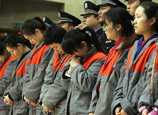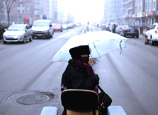
 |
| (Photo/ China Daily) |
Preventive care
"Even in developed economies like the United States, health insurance is a heavy financial burden for the government," Shi said. "So we encourage the temple's people to protect themselves from getting sick by doing physical exercises as often as possible."
Most of the monks in Shaolin Temple are younger than 40 years old, so their medical expenses are not large, Shi noted.
Also, Shaolin Temple has a public-funded medicine bureau, where the monks and the tourists can get medicinal herbs free of charge to treat some minor diseases.
To date, the number of people covered by the new rural cooperative medical care system has surged from 80 million in 2003 to 900 million nationwide now.
"The coverage has kept growing though it's not so generous," said Wu Ming, assistant director of the Peking University's Health Science Center.
Also, as an important part of the ongoing medical reform in China, the system helped the country edge much closer to universal healthcare, she said.
By the end of 2015, basic health insurance coverage is expected to rise to about 98 percent from the current 95 percent, according to the Ministry of Health.
This is despite the fact that the coverage is not mandatory, said Liu, the economics professor.
Wang Yuliang, a resident of Sanyao village in Xi'an, Shaanxi province, said he joined the policy in 2004.
"I only paid 10 yuan as the annual premium and got a reimbursement of more than 2,000 yuan that year," he said, adding that the policy is not as good for outpatient care as it is for inpatient services.
"But given the quite low premium, I will constantly participate," said the 54-year-old man, who has diabetes and high blood pressure.
Some, however, thought otherwise about the policy.
Jing, the health bureau official, said that the monks and nuns at Sanhuangzhai Buddhist Hall turned her down when she asked if they would like to buy the health insurance.
"A 92-year-old nun told me that she has gotten used to the traditional herbal therapy self-provided at the Buddhist hall, and she doesn't want to go to a hospital," Jing said.
Besides, the Buddhist hall is on top of a 900-meter mountain, and it's difficult for the elderly nuns and monks to go down to get to the hospital, she added.
Shi, the Shaolin Temple executive director, suggested that the government should attach more importance to public education of basic health.
"If 30 percent of the government's medical cost could be used to educate the people about how to prevent diseases, there will be fewer patients, and the government's health insurance burden will be eased," he said.
Famous for its kung fu performance, Shaolin Temple has a higher income from ticket sales than many other temples, and it can afford to pay the monks' medical expenses.
"For many less famous temples, where there are not as many tourists, health insurance might help more to ease the monks' financial burden," Shi said.
Nationwide, local governments issued rules in recent years concerning health insurance coverage of religious groups.
In general, they can choose to participate in the policies according to the location of their religious institutions like temples, Jing said.
Wu added, "No one should be left out if they were willing to join."

















 High-profile divorce saga ends
High-profile divorce saga ends


![]()
